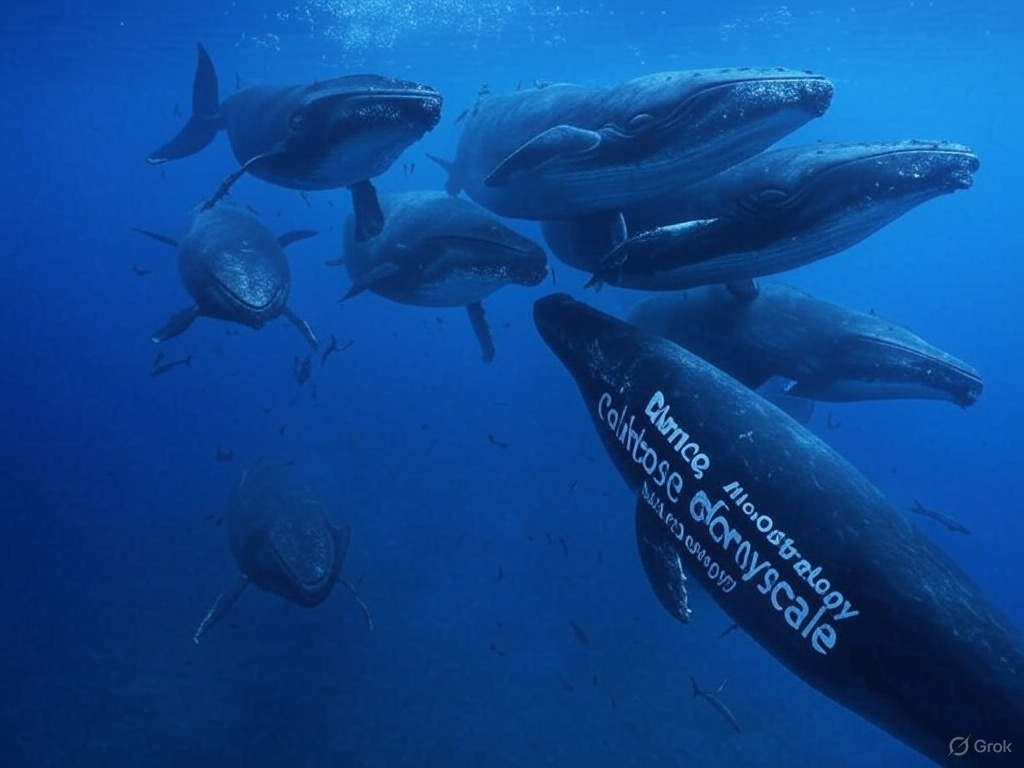Hello!
Bitcoin, the decentralized dream that once promised financial freedom for the everyman, has increasingly become a playground for the ultra-wealthy.
 These so-called "Bitcoin whales"—individuals or entities holding massive amounts of BTC—have quietly amassed disproportionate control over the cryptocurrency’s ecosystem.
These so-called "Bitcoin whales"—individuals or entities holding massive amounts of BTC—have quietly amassed disproportionate control over the cryptocurrency’s ecosystem.
Among the prime contenders are Binance, BlackRock, Coinbase, MicroStrategy, and Grayscale, each wielding significant influence through their holdings and operations. While the ethos of Bitcoin was built on breaking away from centralized power, the reality today is starkly different.
The concentration of wealth in the hands of a few threatens the principles that made Bitcoin revolutionary. It’s time to shear the wool from these whales and rethink how the crypto space can return to its roots.
The Rise of the Whales
 In Bitcoin’s early days, it was miners, enthusiasts, and small-scale investors who fueled its growth. But as the price skyrocketed—reaching over $60,000 in 2021 and fluctuating wildly since—the landscape shifted.
In Bitcoin’s early days, it was miners, enthusiasts, and small-scale investors who fueled its growth. But as the price skyrocketed—reaching over $60,000 in 2021 and fluctuating wildly since—the landscape shifted.
Today, blockchain analytics reveal that a tiny fraction of wallets control a staggering portion of Bitcoin’s supply. According to Glassnode, just 2% of Bitcoin addresses hold over 95% of the total BTC in circulation.
Leading the charge are entities like Binance, with its vast exchange reserves; BlackRock, dipping its toes into crypto via ETFs; Coinbase, a custodial giant; MicroStrategy, hoarding BTC as a corporate strategy; and Grayscale, managing billions in Bitcoin trusts.
These whales include early adopters, institutional investors, and shadowy figures who’ve stockpiled coins, often through opaque means.
 This concentration isn’t just a statistic—it’s a power dynamic. Whales like Binance and Coinbase can sway markets with a single trade, while MicroStrategy’s aggressive buying sprees signal corporate dominance.
This concentration isn’t just a statistic—it’s a power dynamic. Whales like Binance and Coinbase can sway markets with a single trade, while MicroStrategy’s aggressive buying sprees signal corporate dominance.
BlackRock and Grayscale, with their institutional heft, bring Wall Street into the crypto wilds, further tilting the scales.
For the average hodler, it’s like playing poker with someone who owns the table, the cards, and half the chips. The decentralized dream starts to feel like a rigged game.
How Whales Manipulate the Market
 Bitcoin’s price volatility is no secret, but what’s less discussed is how whales exploit it. Binance, as the world’s largest exchange, holds vast BTC reserves that can flood or starve the market at will.
Bitcoin’s price volatility is no secret, but what’s less discussed is how whales exploit it. Binance, as the world’s largest exchange, holds vast BTC reserves that can flood or starve the market at will.
BlackRock’s potential ETF moves could trigger massive inflows—or outflows—based on its whims. Coinbase’s custodial services give it leverage over retail funds, while Grayscale’s trust redemptions have historically jolted prices.
MicroStrategy, with over 200,000 BTC as of early 2025, can single-handedly spark FOMO or fear with its announcements. Large holders also engage in tactics like "spoofing"—placing massive buy or sell orders to trick smaller traders, only to cancel them—or orchestrate "pump and dump" schemes, inflating prices before cashing out.
The 2021 bull run saw allegations of such whale-driven manipulation, leaving retail investors in the dust.
Then there’s the mining angle. Whales don’t just hold Bitcoin—they often control the infrastructure.
Binance, for instance, operates mining pools, while institutional players like BlackRock could indirectly influence hash rate through investments.
These large pools dominate the network, giving whales outsized sway over Bitcoin’s security. The proof-of-work system, meant to democratize participation, now favors those with capital to burn.
The Threat to Bitcoin’s Vision
Satoshi Nakamoto envisioned a peer-to-peer cash system free from intermediaries. Yet, the rise of whales like Binance, BlackRock, Coinbase, MicroStrategy, and Grayscale mirrors the wealth inequality Bitcoin aimed to disrupt.
 When a handful of players can dictate trends—Binance through trading volume, BlackRock through financial clout, or MicroStrategy through corporate hoarding—it undermines the idea of a currency for the people.
When a handful of players can dictate trends—Binance through trading volume, BlackRock through financial clout, or MicroStrategy through corporate hoarding—it undermines the idea of a currency for the people.
New adopters see not liberation, but another tool for the rich, alienating them from the crypto promise.
The environmental critique of mining often overshadows this deeper issue: economic centralization. Yes, energy use matters, but the power concentrated in these whales is a more existential threat.
If Bitcoin becomes an asset class dominated by Grayscale’s trusts or Coinbase’s vaults, its transformative potential fades.
On topic:
- The Inevitable Burst of the Crypto Bubble: What Needs to Happen?
- The Cryptocurrencies, Meme Coins, and the "Dead Cat Bounce" Phenomenon in 2025
- South Korea's authorities have ordered the country's largest cryptocurrency exchange to suspend operations.
Shearing the Wool: A Path Forward
How do we level the field against titans like Binance, BlackRock, Coinbase, MicroStrategy, and Grayscale? It starts with community action and innovation:
- Encourage Distribution Through Incentives: Projects could reward smaller holders with airdrops or staking benefits, diluting the dominance of Grayscale’s trusts or MicroStrategy’s stash. Bitcoin lacks such mechanisms, but layer-two solutions could experiment here.
- Transparency Tools: Blockchain analytics can expose whale movements—say, Binance’s reserve shifts or Coinbase’s custodial flows—in real-time, empowering retail investors. Platforms like Whale Alert could expand to track these giants specifically.
- Decentralized Governance: Bitcoin’s lack of formal governance is a weakness when facing BlackRock’s influence or MicroStrategy’s buying power. Mechanisms to limit large holders, without compromising decentralization, could curb manipulation.
- Education and Awareness: The community must call out whale behavior—whether it’s Binance’s market plays or Grayscale’s trust dynamics—and reject narratives glorifying hoarding. Bitcoin’s strength lies in its users, not its tycoons.
Conclusion
Bitcoin wasn’t meant to mint a new aristocracy led by Binance, BlackRock, Coinbase, MicroStrategy, and Grayscale.
 These whales may have grown fat grazing on the crypto plains, but it’s not too late to shear their wool and redistribute the balance—figuratively, if not literally.
These whales may have grown fat grazing on the crypto plains, but it’s not too late to shear their wool and redistribute the balance—figuratively, if not literally.
The technology still holds promise as a tool for financial sovereignty, but only if the community protects it from those turning it into a gilded cage.
It’s time to remind these whales: Bitcoin isn’t their personal piggy bank—it’s ours.
Thank you!
Subscribe to our newsletter! Join us on social networks!
See you!






